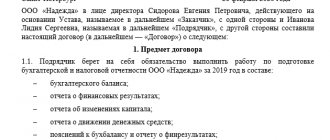On July 11, 2015, the Federal Law of June 29, 2015 No. 200-FZ “On Amendments to Article 64 of the Labor Code of the Russian Federation” came into force, establishing a specific period for providing a person who applied to an employer and was refused to conclude an employment contract, notification of the reasons for such refusal in writing - 7 days. At the request of a person who is refused to conclude an employment contract, the employer is obliged to provide the reason for the refusal in writing.
Before the adoption of this law, the period within which a potential employer had to give a written response was not established by labor legislation. That is, the norm aimed at protecting the rights of citizens when hiring was actually inapplicable, since there was nothing to hold the employer accountable for and entailed the presence of various types of abuses on the part of employers.
Establishing such a deadline is extremely important, since only on the basis of a written refusal can an applicant exercise his right to appeal against a refusal to hire in court. The complexity of this category of cases lies in the fact that, since the current legislation contains only an approximate list of reasons why the employer does not have the right to refuse employment, and the question of whether discrimination occurred when refusing to conclude an employment contract is decided by the court when considering specific case (clause 10 of the resolution of the Plenum of the Supreme Court of the Russian Federation dated March 17, 2004 No. 2).
Each of us at least once went through the search and hiring procedure, and it was not always possible to find the right one the first time. Often, before the job we were interested in was found, we had to receive a refusal to hire. At first glance, there is nothing special about this concept, an ordinary question that any applicant faces, but you need to know that refusal to hire is a concept that is enshrined and strictly regulated by the Labor Code of the Russian Federation.
Guarantees when concluding an employment contract are established by Art. 64 of the Labor Code of the Russian Federation, part one of which states that unjustified refusal to conclude an employment contract is prohibited. That is, such a refusal that has no legal basis, for example, a refusal to conclude an employment contract for employees invited in writing to work by way of transfer from another employer, within one month from the date of dismissal from their previous place of work, or a refusal to women on the grounds associated with pregnancy or the presence of children.
WHAT IS THE RISK OF VIOLATING LABOR LAW?
It is also prohibited to any direct or indirect restriction of rights or establishment of advantages when concluding an employment contract depending on gender, race, skin color, nationality, language, origin, property, family, social and official status, age, place of residence (in including the presence or absence of registration at the place of residence or stay), attitude to religion, beliefs, membership or non-belonging to public associations or any social groups, as well as other circumstances not related to the employee’s business qualities. The exception is cases provided for by federal laws, for example, Federal Laws of November 7, 2000 No. 136-FZ “On the social protection of citizens engaged in work with chemical weapons”, dated January 10, 1996 No. 5-FZ “On Foreign Intelligence” .
For the purpose of effective economic activity and rational property management, the employer independently, under his own responsibility, makes the necessary personnel decisions (selection, placement, dismissal of personnel), and concluding an employment contract with a specific job seeker is the right, not the obligation of the employer. Thus, an employer can refuse to hire a specific person if there are sufficient grounds and provided that the candidate is not one of those who, by virtue of the law, are in principle prohibited from refusing to conclude an employment contract (clause 10 of the resolution of the Plenum of the Armed Forces of the Russian Federation dated March 17 .04 No. 2).
What grounds can be considered justified for refusal to hire, and what not? Can an employer require temporary registration from its employees if they come to work in Moscow or the Moscow region from other cities?
No, the lack of registration at the place of residence or stay of a person hired for work is not an obstacle to his employment.
REGISTRATION IN MOSCOW FOR FOREIGN CITIZENS
Everyone has equal opportunities to exercise their labor rights. No one can be limited in labor rights and freedoms or receive any advantages depending on their place of residence, as well as on other circumstances not related to the employee’s business qualities (Article 3 of the Labor Code of the Russian Federation).
In Art. 65 of the Labor Code of the Russian Federation specifies the documents that the employer has the right to require when hiring an applicant. The document confirming the registration of the employee at the place of residence or place of stay is not mentioned in the article. Thus, labor legislation prohibits restrictions on labor rights and freedoms depending on place of residence. Therefore, an employer’s refusal to hire on the grounds that the future employee does not have registration at the place of residence or stay is illegal. A similar position is taken by the Plenum of the Armed Forces of the Russian Federation in paragraph 11 of Resolution No. 2: such a refusal violates the right of citizens of the Russian Federation to freedom of movement, choice of place of stay or residence, guaranteed by the Constitution of the Russian Federation, and also contradicts part 2 of Art. 64 of the Labor Code of the Russian Federation, which prohibits limiting rights or establishing any advantages when concluding an employment contract on the specified basis.
DRAFTING AN EMPLOYMENT CONTRACT
As we see, the employer is obliged to conclude an employment contract with an applicant who does not have registration at the place of residence or stay, if his business qualities meet the established requirements.
What prohibition does Article 64 of the Labor Code of the Russian Federation impose?
Article 64 of the Labor Code of the Russian Federation prohibits an employer from refusing a potential employee to conclude an employment contract in the absence of proper grounds. This condition, enshrined in labor legislation, is:
- for the employer - a limiter on arbitrariness when hiring employees;
- for the employee - a guarantee that if he meets the requirements for applicants for the position, there will not be an unmotivated refusal from a potential employer.
In some cases, labor legislation does not leave the employer the slightest chance to make an independent decision whether to enter into an employment contract or not. For example, it is prohibited to refuse employment:
- a woman who has children or is expecting the birth of a baby (paragraph 3 of Article 64 of the Labor Code of the Russian Federation);
- employees who came from another employer by written invitation, if this happened within a month from the date of dismissal from their previous job (paragraph 4 of article 64 of the Labor Code of the Russian Federation);
- employees elected to a position (Articles 16, 17 of the Labor Code of the Russian Federation) or who have passed the appropriate competitive procedure (Articles 16, 18, 332 of the Labor Code of the Russian Federation);
- persons who presented the employer with a court decision that has entered into force, ordering an employment contract to be concluded with them (Article 16 of the Labor Code of the Russian Federation);
- patients with HIV, if the reason for refusal is illness (Article 17 of the Federal Law “On preventing the spread in the Russian Federation of the disease caused by the human immunodeficiency virus (HIV infection)” dated March 30, 1995 No. 38-FZ);
- a disabled employee, if he is employed according to the quota established for a given employer (Article 16 of the Labor Code of the Russian Federation, Article 13 of the Law of the Russian Federation “On the social protection of disabled people in the Russian Federation” dated April 19, 1991 No. 1032-I);
- in other cases provided for by law.
Does the employer have the right to refuse to hire if the applicant refuses to provide information about his work activity in the STD-R or STD-PFR form? The answer to this question is in ConsultantPlus. If you do not have access to the K+ system, get a trial online access for free.
If the employer does not take into account legislative prohibitions, he may face administrative (and in some cases criminal) liability.
Justification for refusal to hire
The material was prepared using legal acts as of May 31, 2021.
Labor legislation provides for a ban on unjustified refusal to conclude an employment contract for certain categories of citizens <1>. Based on a literal reading of this provision, we can conclude that we are not talking about a prohibition of refusal to hire as such, but only about a prohibition of an unreasonable refusal.
Which refusal is unfounded?
A refusal is unreasonable if:
– the grounds that caused the refusal do not relate to the business and professional qualities of the employee;
– the grounds for refusal are directly prohibited or not provided for by law;
– the employer refuses to motivate his decision or cannot justify the legality of refusing to hire a specific person.
| Example 1 An employer refused to hire a citizen because she had two young children, citing the fact that small children often get sick, and therefore she would often take sick leave. Example 2 A citizen was refused a job due to the fact that his brother is serving a sentence for theft of property |
Who cannot be refused a job without justification?
Unreasonable refusal to conclude an employment contract with persons <2> is prohibited:
– directed to work by the Committee on Labor, Employment and Social Protection of the Minsk City Executive Committee, departments (departments) on labor, employment and social protection of city, district executive committees (hereinafter referred to as labor authorities) on account of the reservation <3>;
– obligated to reimburse expenses spent by the state on the maintenance of children who are on state support, and sent by labor authorities to organizations included in the list of organizations, regardless of their form of ownership, for the employment of such persons, determined in the manner prescribed by law <4>;
– by written invitation to work in the order of transfer from one employer to another as agreed between them, within one month from the date of issuance of the written invitation, unless the parties agree otherwise <5>. If the parties have agreed on a different period, for example two months, then the new employer cannot unreasonably refuse to hire the employee for two months;
– those who arrived to work after completing their studies at a state educational institution, an organization implementing educational programs of postgraduate education <6>;
– having the right to conclude an employment contract on the basis of a collective agreement, agreement <7>. The legislator makes it possible to expand the existing list of persons against whom unreasonable refusal of employment is permitted. Thus, the collective agreement may provide for other categories of persons who are prohibited from refusing employment without specifying reasons;
– those who arrived to work on assignment after completing their studies at a state educational institution <8>;
- women for reasons related to pregnancy or the presence of children under the age of three, and single mothers - with the presence of a child under the age of fourteen (a disabled child - up to eighteen years) <9>. These categories of citizens are, in principle, prohibited from refusing to conclude an employment contract for the above reasons <10>;
– military personnel of compulsory military service, discharged from the Armed Forces of the Republic of Belarus, other troops and military formations of the Republic of Belarus and sent to work on account of reservation to provide the first job <11>;
– dismissed from alternative service and sent to work on account of reservation to provide the first job <12>.
| Note! If the persons listed above do not agree with the terms of the contract proposed to them for conclusion, then this may be grounds for refusing to hire them <13> |
Who and how is the employer obliged to notify the reasons for the refusal?
In the cases provided for above, at the request of a citizen or a specially authorized government body, the employer is obliged to inform them of the reasons for refusing to hire. The form of expression of the requirement is not defined by law. Therefore, in our opinion, it can be both written and oral.
| Note! The employer is obliged to notify the citizen (authorized state body) of the reasons for the refusal in writing and no later than three days after the application <14>. Such notice can be sent by mail, fax, or by handing it against signature to a citizen or official of a specially authorized government body |
A notice of the reasons for refusal to hire can be drawn up in any form. The main condition is that it must indicate the reasons for refusing to conclude an employment contract.
Example of notice wording:
“We notify you of the reasons for refusal to hire for the position of HR specialist for the following reasons:
the resume submitted on April 26, 2017 indicates that you do not have the required level of education: you have a secondary specialized education, and the open vacancy requires a specialist with a higher professional education;
In accordance with the requirements for candidates for the position of HR specialist in our organization, testing must be at least 60% effective. According to the results of testing conducted on April 28, 2017, you have 25% correct answers, which indicates insufficient qualifications to fill the vacant position."
| Note! Refusal to hire must always be caused by reasons related to the competence and business qualities of the candidate |
What are the consequences of an unjustified refusal for the employer?
Refusal to conclude an employment contract may be appealed to the court <15>.
The following may apply to the court to challenge the employer's refusal to conclude an employment contract <16>:
– citizens who are prohibited from refusing employment without justifying the reasons for the refusal;
– other persons who consider the refusal to hire unfounded.
If the refusal to hire is recognized as unfounded, the court makes a decision that obliges the employer to enter into an employment contract, and also sets a deadline for the execution of its decision <17>.
| Note: A court decision imposing the obligation on the employer to conclude an employment contract cannot affect the content and terms of the employment contract, which are determined by agreement of the parties in compliance with the requirements stipulated by labor legislation <18> |
As a result of refusal or untimely conclusion of an employment contract, an employee may commit forced absenteeism. In this case, payment for absenteeism is made based on the employee’s rate (official salary) for the job (position) for which the plaintiff was refused <19>.
What is the liability for an unreasonable refusal to hire?
The legislation of the Republic of Belarus provides for administrative and criminal liability of an employer's official for refusal (unreasonable refusal) to hire.
Thus, for an unjustified refusal to hire a citizen sent by labor authorities on account of reservation, administrative liability may arise in the form of a fine in the amount of 20 to 50 basic units <20>.
Administrative liability in the same amount may result from refusal to hire <21>:
– a graduate of a state institution of vocational, technical, secondary or higher education, sent to work in accordance with the application of this employer or an agreement on cooperation concluded between the educational institution and this employer;
– a person with whom the conclusion of an employment contract is mandatory.
At the same time, an unjustified refusal to hire a woman on the grounds of her pregnancy may result in criminal liability in the form of deprivation of the right to hold certain positions or deprivation of the right to engage in certain activities, or correctional labor for up to 2 years, or imprisonment for up to 3 years. <22>.
Thus, in order to avoid negative consequences and litigation, an employer’s refusal to hire a citizen should only be caused by reasons related to the competence, business and professional qualities of the applicant.
How will the employer be punished if he violates the prohibition established by Art. 64 Labor Code of the Russian Federation?
If an employer once unreasonably refuses to enter into an employment contract with a potential employee and this situation is discovered by inspectors, the company and its manager may suffer financially.
For unlawful refusal to conclude an employment contract, a fine is possible under Art. 5.27 Code of Administrative Offenses of the Russian Federation:
- from 10,000 to 20,000 rub. - for officials;
- from 5,000 to 10,000 rubles. — for individual entrepreneurs;
- from 50,000 to 100,000 rub. - for companies.
If the employer systematically allows this kind of refusal and has previously been held accountable under Art. 5.27 of the Code of Administrative Offenses of the Russian Federation, an official may be disqualified for a period of 1 to 3 years and a fine on the company in the amount of 100,000 to 200,000 rubles. An entrepreneur in such a situation will be punished in the amount of 30,000 to 40,000 rubles.
An unmotivated refusal to hire a disabled person who came to the workplace in accordance with a quota may lead to punishment of the official under Art. 5.42 of the Code of Administrative Offenses of the Russian Federation in the form of a fine in the amount of 5,000 to 10,000 rubles.
For other types of administrative responsibility of the employer, see the article “What are the penalties for failure to submit accounting reports to statistics?” .
Refusing to respond to a job search site is safe
If the applicant sent his response in response to a vacancy posted on the site, this does not oblige the employer to anything. The validity of a refusal to hire is taken into account by the courts when such a refusal is made after the employer has received an application for employment from an applicant or after the applicant has requested a written justification for the refusal and his employer has provided him with it . Submitting a resume and responding to a job search site does not constitute such a job application, even if the applicant’s experience described in the resume fully meets the requirements of the vacancy.
There have been cases when applicants went to court with a demand to oblige the employer to justify a refusal to hire only on the basis of a resume sent by the applicant, including through a job site, but in these cases the courts sided with the employing company.
Arbitrage practice:
- Appeal ruling of the Investigative Committee for civil cases of the Arkhangelsk Regional Court dated 07/04/19 in case No. 33-3764/2019;
- Appeal ruling of the Investigative Committee for civil cases of the Arkhangelsk Regional Court dated June 10, 2019 in case No. 33-3175/2019;
- Appeal ruling of the Investigative Committee for civil cases of the Arkhangelsk Regional Court dated May 29, 2019 in case No. 33-2846/2019;
- Appeal ruling of the Investigative Committee for civil cases of the Arkhangelsk Regional Court dated April 10, 2019 in case No. 33-1991/2019).
You have every right to refuse candidates at the stage of applying for a vacancy. Based solely on the applicant's response to a vacancy, there is no obligation to explain the reasons for refusal to each specific candidate. If you still decide to justify the refusal, make sure that your wording does not contradict the rules established by the Labor Code.
When does the Labor Code of the Russian Federation allow an employer to refuse an applicant?
The company administration has the right to refuse a potential employee to sign an employment contract if:
- the applicant’s business qualities do not meet the requirements;
- Federal laws provide for restrictions on hiring.
Business qualities include a combination of the following abilities and properties:
- labor - a person’s ability to perform a specific labor function;
- professional (qualification) - the presence of a certain profession, the necessary qualifications;
- personal (personal) - health status, level of education, work experience, professional skills;
- specific - related to the characteristics of the work (proficiency in foreign languages, specialized computer programs, etc.).
In Art. 64 of the Labor Code of the Russian Federation lists probable advantages or restrictions on rights, the presence (or absence) of which cannot in any way affect the employer’s decision if the business qualities of the potential employee meet all the requirements. For example:
- gender and/or race of the applicant (discrimination on the basis of race or gender is prohibited);
- genetic and other individual characteristics (skin color, nationality, origin, language);
- age (too young or old);
- status (property, family, official, social);
- place of residence (including lack of registration at the place of residence or registration);
- religious affiliation, beliefs, membership (or lack thereof) in associations or public groups.
This means that with the same business qualities of a bachelor and a citizen with many children, a rich man and a poor man, an African American and a European, a Kyrgyz and a Tatar, a Muslim and a Christian, it will be difficult for an employer to refuse them a job.
Many newly hired men do not present military IDs, citing the lack of them. Is the employer obliged to enter into an employment contract with such persons? Do they need to declare that they do not have a military ID? Answers to these and other questions are available in ConsultantPlus. Get free demo access to K+ and go to the Ready Solution to find out all the details.
Grounds for refusal
The following are recognized as legal grounds for refusing a candidate:
Inconsistency of the applicant’s qualifications with the vacant position (confirmed by the lack of necessary documents, revealed at an interview or during the probationary period).
Lack of knowledge, experience or skills necessary for future activities (confirmed by documents, recommendations, interviews, tests, tests, etc.)
Unsuitable health status for this vacancy (confirmed by medical documents).
Lack of suitable vacancies at the time of application (confirmed by the staffing table).
Psychological inconsistency (confirmed by testing, interview, probation period).
When an employer not only can, but is obliged to refuse
There are cases when an employer not only can, but must refuse a candidate because a certain type of activity is prohibited by law for certain persons or the law provides for other restrictions.
When it is not only possible to refuse, but also necessary
| Rejection reason | Legal justification |
| The candidate is under 16 years old | For the work of workers under this age, the law provides for restrictions - in particular, their working day can be no more than 4-5 hours, and they can only work without compromising their studies, for example, on vacation (Articles 63, 94 of the Labor Code of the Russian Federation). If the job does not imply the ability to provide such restrictions, the candidate cannot be accepted |
| The candidate is under 18 years old | There are also restrictions for persons under this age (Articles 94, 96, 265 of the Labor Code of the Russian Federation, Decree of the Government of the Russian Federation dated February 25, 2000 No. 163 “On approval of the list of heavy work and work with harmful or dangerous working conditions, during which the use of labor by persons is prohibited under eighteen years of age"). Therefore, if this job does not imply the possibility of such restrictions, the candidate will have to be refused |
| The activity is subject to restrictions on the use of women's labor | Some types of hard work and work with harmful working conditions are prohibited for women in order to take care of their health (Article 96, 253 of the Labor Code of the Russian Federation): ● Decree of the Government of the Russian Federation of February 25, 2000 No. 162 “On approval of the list of heavy work and work with harmful or dangerous working conditions, during which the use of women’s labor is prohibited”; ● Order of the Ministry of Labor of Russia dated July 18, 2019 No. 512n “On approval of the list of productions, works and positions with harmful and (or) dangerous working conditions in which the use of women’s labor is limited” - effective from January 1, 2021 |
| Due to restrictions on engaging in teaching activities or activities in the field of education, upbringing, and development of minors | Candidates who have been prosecuted for committing certain crimes cannot be accepted for such positions (Articles 331, 351.1 of the Labor Code of the Russian Federation) |
| Activities are subject to other restrictions established by law | For example, Article 16 of the Federal Law of July 27, 2004 No. 79-FZ “On the State Civil Service of the Russian Federation” establishes that a citizen cannot be accepted into the civil service in the case of a close relationship with another employee, if the work is related to the direct subordination or control of one of them to another, or the presence of foreign citizenship |
| The candidate is deprived of the right to hold certain positions or engage in certain activities | This applies to candidates: ● who have not passed the mandatory medical examination (Articles 69, 213, 266,324 of the Labor Code of the Russian Federation, List approved by order of the Ministry of Health and Social Development of Russia dated April 12, 2011 No. 302n); ● those who did not present the documents required for employment (Articles 65, 283 of the Labor Code of the Russian Federation); ● deprived of the right to hold certain positions as a criminal punishment (Article 47 of the Criminal Code of the Russian Federation); ● disqualified (Article 3.11 of the Code of Administrative Offenses of the Russian Federation) |
| The candidate is a foreign citizen, and you have not met the requirement for the quota for hiring foreign labor | To be hired, an organization must have a quota for hiring foreign labor. An exception is citizens of countries with which an international treaty has been concluded (Belarus, Kyrgyzstan, etc.) ● See Art. 13, 14, 18 of the Federal Law of July 25, 2002 No. 115-FZ “On the legal status of foreign citizens in the Russian Federation.” |
Unlock access to the private part of Clerk with a Premium subscription. Get hundreds of webinars and online courses, unlimited consultations and other proprietary content for accountants.
Hurry up to subscribe with a 20% discount until October 15, 2021. Read more about “Premium” here.
When is it acceptable to refuse candidates?
Hiring is not an obligation, but a right. Job seekers sometimes believe that since a vacancy has opened in a company, it means that the employer is obliged to hire the first candidate for this position who formally meets all the requirements. But in fact, labor legislation does not contain rules obliging the employer to fill vacant positions immediately as they arise.
If, for example, a programmer vacancy receives, for example, 10 responses, you have every right to choose one candidate that is most suitable in all respects, and refuse the rest simply on the basis that there is only one position, and your selection has already been closed.
Judicial practice (Appeal ruling of the Primorsky Regional Court dated September 11, 2018 in case No. 33-8553/2018) knows a case where a kindergarten teacher tried to challenge an official refusal to hire, because it was not her who was hired, but another person with a slightly less work experience. The court did not recognize this refusal as unfounded, since the employer has every right to choose between candidates, taking into account different criteria and circumstances.
The very fact of posting a vacancy on a personnel search website does not oblige you to anything. It does not always mean that the company has a vacant position right now: sometimes a vacancy is posted for market research ㅡ for example, when you are starting work in a new region and want to better understand the level of candidates and their salary expectations.
Another fairly common belief among job seekers is that employers are required to justify every refusal. No, in most cases there is no need to justify the refusal.
When you are required to justify your refusal: only if the candidate has sent you a written request to do so. Moreover, we are talking about a demand on paper, with a signature, and not about an email letter or a phone call. The reason for refusal will also need to be communicated in writing within 7 working days from the date of receipt of such a letter.
What is the penalty for an unreasonable refusal?
For an unreasonable refusal, the employer may face two types of liability - administrative or (in special cases) criminal.
Liability for unjustified refusal to hire
Applicants can also appeal the refusal in court. In practice, what most often happens is this: the applicant goes to court, demanding that the employer conclude an employment contract with him, pay wages for the period from the moment the interview took place (but he was not hired), as well as pay compensation for moral damages and any - costs associated with refusal (for example, travel to the interview site if the person is from another city).
If the court finds the refusal unfounded, it will oblige the applicant to compensate the costs incurred. The practice of awarding compensation for moral suffering in our country is very heterogeneous - it all depends on the specific situation and even on the region. But in any case, we are not talking about large sums.
But the courts almost always reject the requirement to conclude an employment contract, arguing that it is possible to appeal the very fact of an unjustified refusal, but not the fact of non-conclusion of an employment contract.






